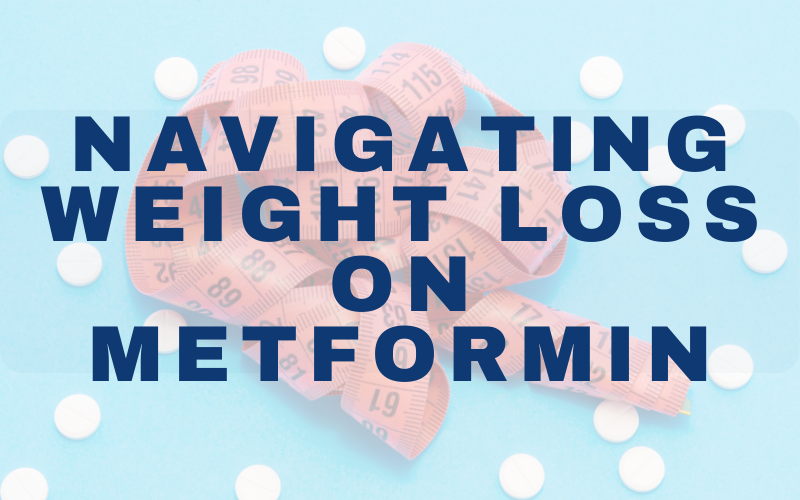Embark on a transformative journey, dear readers, as we delve into the incredible potential of weight loss on Metformin– the key to unlocking a healthier, happier you! In a world where the struggle with obesity is prevalent, the significance of effective weight management cannot be overstated. We’re here to have a conversation that could be a game-changer in your wellness quest.
Now, let’s talk about a little powerhouse called Metformin. Often recognized for its role in managing type 2 diabetes, this medication has been making waves in discussions about weight loss. You’re in the right place if you’ve ever wondered about the potential synergy between Metformin and shedding those extra pounds.
In this blog, we’ll unravel the mysteries surrounding Metformin and its primary purpose in type 2 diabetes. But here’s the exciting part – we’re not stopping there. We focus on delving deeper, exploring the untapped potential that Metformin may hold in weight loss. So, buckle up because we’re about to embark on a journey that could reshape your understanding of Metformin and your approach to achieving a healthier weight. Get ready to discover the possibilities and unleash the potential of weight loss on Metformin!
Table of Contents
Understanding Metformin
Metformin, often touted as the cornerstone in diabetes management, belongs to the biguanide class of medications, earning its place among potent oral hypoglycemic drugs [1]. As we unravel the layers of this pharmacological gem, it’s crucial to understand its fundamental nature and primary mechanisms of action.
Definition and Classification of Metformin as a Biguanide
Metformin, classified as a biguanide, is a robust antihyperglycemic agent. It is positioned among a group of oral hypoglycemic drugs renowned for their efficacy in glycemic control and potential implications in weight management [1].
Primary Mechanisms of Action: Glucose Production Reduction, Insulin Sensitivity Improvement, and Enhanced Glucose Utilization
Metformin’s effectiveness lies in its multifaceted approach to glucose regulation. The medication primarily reduces glucose production in the liver, a process known as gluconeogenesis. Reducing endogenous glucose production is pivotal in controlling elevated blood sugar levels. Furthermore, Metformin enhances insulin sensitivity, allowing the body’s cells to respond better to insulin signals and promoting more efficient energy utilization. This dual action not only aids in glycemic control but also sets the stage for potential benefits in weight management [1].
Overview of Metformin’s Traditional Role in Diabetes Management
While our exploration focuses on metformin’s potential impact on weight loss, it’s essential to acknowledge its long-standing reputation as a cornerstone in diabetes management. Initially approved for clinical use in the late 1950s, Metformin has become the first-line pharmacological therapy for type 2 diabetes.
Its ability to effectively lower blood glucose levels with a low risk of hypoglycemia has positioned it as a preferred choice for millions of individuals worldwide. Numerous studies, such as the United Kingdom Prospective Diabetes Study (UKPDS), have underscored the positive outcomes associated with Metformin use, showcasing its ability to reduce diabetes-related complications. As we navigate the intricate landscape of metformin’s mechanisms and applications, it becomes evident that its traditional role in diabetes management is intertwined with its potential benefits in weight loss [1].

The Link Between Metformin and Weight Loss
In this section, we examine how metformin, beyond its diabetes management prowess, might play a pivotal role in the journey toward weight loss.
Exploration of Studies Suggesting Metformin’s Impact on Appetite Regulation
Recent studies have hinted at metformin’s potential role in appetite regulation, proposing that the medication may influence certain hormones and neurotransmitters linked to hunger. This suggests that Metformin could be a key player in reducing appetite and overall food intake, potentially contributing to a caloric deficit—a crucial aspect of weight loss on Metformin [2].
Discussion of How Metformin’s Metabolic Effects May Contribute to Weight Loss
Metformin’s metabolic effects extend beyond glycemic control, holding promising implications for weight management. Metformin creates an environment conducive to efficient metabolism by improving insulin sensitivity and glucose utilization. This metabolic optimization not only aids in glucose regulation but may also foster an environment where the body is more predisposed to weight loss on Metformin [2].
Examination of Research Indicating a Potential Reduction in Fat Storage
Emerging research suggests that Metformin may impede fat storage in adipose tissue. This potential reduction in fat storage could be a significant factor in achieving and sustaining weight loss. As adipose tissue is a primary site for fat accumulation, inhibiting this process may contribute to a more favorable body composition during weight loss on Metformin [2].
Highlighting Improvements in Lipid Profiles as a Factor in Weight Management
Metformin has been associated with improved lipid profiles, including reduced levels of triglycerides and LDL cholesterol. Beyond its direct impact on glucose and fat metabolism, these improvements in lipid parameters contribute to cardiovascular health. They may play a crucial role in overall body weight management, especially during weight loss on Metformin [2].
As we explore these aspects, it becomes evident that metformin’s influence on various physiological processes goes beyond its established role in diabetes management, offering a multifaceted approach to weight loss on metformin.

Considerations and Precautions
Navigating the path of Metformin use for weight loss is a nuanced journey, requiring careful considerations and diligent precautions to ensure a safe and effective experience.
Emphasizing the Importance of Individualized Response to Metformin
It’s crucial to recognize that individual responses to Metformin can vary significantly. Age, genetics, and overall health are pivotal in determining how one’s body reacts to the medication. Therefore, the approach to Metformin use for weight loss must be personalized and tailored to each individual’s unique characteristics and needs. This emphasis on individualized response underscores the importance of consulting with healthcare professionals who can assess and adjust the treatment plan accordingly [3].
Discussion of Common Side Effects, Particularly Gastrointestinal Issues
Like any medication, Metformin is not without its side effects, and a key player in this realm is the gastrointestinal system. Common side effects may include nausea, vomiting, diarrhea, and abdominal discomfort. While these side effects are often temporary and tend to subside as the body adjusts to the medication, they can be a significant concern for some individuals. Therefore, it’s crucial for those considering Metformin for weight loss to be aware of these potential issues and to discuss them with their healthcare provider [3].
Stressing the Need for Medical Supervision and Monitoring During Metformin Use
Metformin use, especially in the context of weight loss, necessitates vigilant medical supervision. Healthcare professionals play a pivotal role in overseeing the treatment, monitoring for any adverse effects, and making necessary adjustments to dosage or treatment plans. Regular check-ups and open communication with a healthcare provider are paramount to ensuring the safe and effective use of Metformin for weight loss. Stressing the need for medical supervision underscores the commitment to prioritizing individual health and well-being throughout the weight loss journey on Metformin [3].
As individuals consider incorporating Metformin into their weight loss strategy, these considerations and precautions provide a foundation for a safe and personalized approach under healthcare professionals’ guidance.
Individual Response to Metformin
Understanding how individuals respond to Metformin is crucial to harnessing its potential for weight loss. Let’s investigate the factors influencing this unique response and why personalized guidance is essential.
Factors Influencing the Effectiveness of Weight Loss on Metformin
The effectiveness of Metformin in promoting weight loss varies among individuals. Several factors contribute to this variability, including metabolic rate, baseline health, and lifestyle factors. Metformin may showcase remarkable effects in facilitating weight loss for some, while others might experience more subtle changes. Recognizing and exploring these factors can offer valuable insights into optimizing the use of Metformin for weight loss [3].
Acknowledgment of the Role of Age, Genetics, and Overall Health in Individual Response
Age, genetics, and overall health are pivotal in determining how an individual responds to metformin. Younger individuals may experience different metabolic responses compared to their older counterparts, and genetic variations can influence the way the body interacts with the medication. Additionally, baseline health conditions can significantly impact the effectiveness of Metformin in promoting weight loss. Acknowledging these influential factors provides a foundation for tailoring Metformin use to meet individual needs, fostering a more personalized and effective approach [3].
Importance of Consulting with a Healthcare Professional for Personalized Guidance
Given the intricate interplay of various factors influencing individual responses to metformin, seeking personalized guidance from a healthcare professional is paramount. Healthcare providers possess the expertise to assess individual health profiles, consider potential interactions with existing medications, and tailor Metformin prescriptions accordingly. This personalized approach ensures that the benefits of Metformin in weight loss are maximized while minimizing any potential risks. The importance of consulting with a healthcare professional underscores the commitment to a safe and individualized weight loss journey on Metformin [3].
As individuals navigate the landscape of Metformin for weight loss, understanding and respecting the uniqueness of each person’s response is integral to achieving optimal outcomes.
Side Effects and Management
Embarking on the journey of weight loss on Metformin involves understanding potential side effects and adopting effective strategies to manage them. Let’s explore common side effects of Metformin and how individuals can navigate them for a smoother weight loss experience.
Overview of Common Side Effects Associated with Metformin
While Metformin is generally well-tolerated, it is not without its side effects. Common side effects may include gastrointestinal issues such as nausea, vomiting, diarrhea, and abdominal discomfort. These side effects are often transient, with the body adjusting to the medication over time. However, acknowledging these potential effects is crucial for individuals incorporating Metformin into their weight loss regimen. By understanding what to expect, individuals can better prepare for and manage these common side effects during their weight loss on the Metformin journey [3].
Discussion of Strategies for Managing Side Effects, Such as Dosage Adjustments and Meal Timing
Effectively managing side effects is integral to optimizing the weight loss experience on metformin. Healthcare professionals may recommend dosage adjustments or meal timing strategies to mitigate gastrointestinal discomfort. Splitting the daily dose, taking the medication with meals, or gradually titrating the dosage are common approaches. These strategies enhance tolerance and promote a more positive and comfortable weight loss journey on Metformin [3].
Encouraging Open Communication with Healthcare Providers Regarding Any Concerns
Open communication between individuals and their healthcare providers is paramount throughout the weight loss on Metformin process. Sharing these with their healthcare team is crucial if individuals experience side effects or have concerns about their medication. This communication allows for timely adjustments to the treatment plan, ensuring individuals can continue their weight loss journey on Metformin with confidence and minimal disruptions. Encouraging open dialogue empowers individuals to participate actively in their healthcare, fostering a collaborative approach to optimizing the weight loss experience on Metformin [3].
As we explore the potential benefits of Metformin in weight loss, acknowledging and managing side effects becomes a proactive step toward achieving a well-balanced and successful weight management strategy.
Medical Supervision and Guidance
Embarking on the journey of weight loss on Metformin requires vigilant medical supervision and collaborative guidance. Let’s explore why using Metformin under the care of a healthcare professional is crucial for a successful and safe weight management experience.
The Necessity of Using Metformin under the Guidance of a Healthcare Professional
Using Metformin for weight loss should always be initiated under the guidance of a healthcare professional. The expertise of healthcare providers is invaluable in assessing the individual’s health status, determining the appropriate dosage, and ensuring that Metformin is a suitable option for weight management. This necessity underscores seeking professional advice before incorporating Metformin into one’s weight loss strategy [3].
Importance of Regular Check-Ups to Monitor Effects and Adjust Dosage if Necessary
Regular check-ups play a pivotal role in monitoring the effects of Metformin and making necessary adjustments to the treatment plan. Healthcare professionals can assess the individual’s response to the medication, evaluate potential side effects, and make informed decisions about dosage modifications if needed. This ongoing monitoring is a proactive approach to ensuring that weight loss on Metformin is effective, safe, and well-tailored to the individual’s needs [3].
Emphasizing the Collaborative Approach between Patients and Healthcare Providers in Achieving Weight Loss Goals
The journey of weight loss on Metformin is a collaborative effort between patients and healthcare providers. Open communication, shared decision-making, and mutual understanding are the cornerstones of a successful collaboration. Healthcare professionals offer guidance, support, and expertise while individuals actively participate in their health journey. Emphasizing this collaborative approach ensures that the weight loss goals are realistic, achievable, and aligned with the individual’s overall well-being. Weight loss on Metformin becomes a medical intervention and a shared commitment toward optimal health.
As we navigate the complexities of using Metformin for weight loss, healthcare professionals’ guidance becomes the compass that steers individuals toward a safe, effective, and personalized approach.
Conclusion
As we draw the curtain on our exploration of metformin’s potential role in weight loss, let’s reflect on the key insights and chart a course forward for those considering Metformin as part of their weight management journey.
In recapitulating our journey, it’s clear that Metformin holds promise beyond its established role in diabetes management. Studies suggest that weight loss on Metformin is not just a possibility but a potential reality for many individuals. From appetite regulation to metabolic effects and reductions in fat storage, the multifaceted mechanisms of Metformin offer a spectrum of benefits that contribute to the pursuit of a healthier weight [1].
The call to action is clear for those contemplating the inclusion of Metformin in their weight management plan. Reach out to healthcare professionals to discuss the potential benefits and individualized considerations. The decision to lose weight on Metformin is collaborative, requiring guidance, expertise, and a personalized approach to ensure a safe and practical experience. Embrace the opportunity to explore Metformin as a tool in your weight management toolkit with the support and supervision of healthcare providers [3].
As we envision success in weight loss on metformin, adopting a holistic approach is essential. Metformin can be a valuable ally, but its potential is maximized when complemented by a balanced diet and regular physical activity. Embrace a lifestyle that promotes overall well-being, recognizing that Metformin is just one piece of the puzzle. A harmonious integration of Metformin with a holistic approach sets the stage for comprehensive weight loss success [3].
In conclusion, the journey of weight loss on Metformin is not just about shedding pounds; it’s about embracing a healthier, more vibrant version of yourself. The potential is there, waiting to be unlocked with careful consideration, medical supervision, and a commitment to holistic well-being.
Are you looking for more insights on weight loss? Read the following blog:
8 Powerful Weight Loss Supplements: Your Ultimate Guide
References:
1. American Diabetes Association. (2019). Pharmacologic Approaches to Glycemic Treatment: Standards of Medical Care in Diabetes—2019. Diabetes Care, 42(Supplement 1), S90–S102. https://doi.org/10.2337/dc19-S009
2. Viollet, B., Guigas, B., Garcia, N. S., Leclerc, J., Foretz, M., & Andreelli, F. (2012). Cellular and molecular mechanisms of metformin: an overview. Clinical Science, 122(6), 253–270. https://doi.org/10.1042/CS20110386
3. Rena, G., Hardie, D. G., & Pearson, E. R. (2017). The mechanisms of action of metformin. Diabetologia, 60(9), 1577–1585. https://doi.org/10.1007/s00125-017-4342-z






Pingback: 4 Efficient Belly Fat Loss Workouts for a Flat Tummy - Healthy Living Journey
Pingback: Night Fat Burner Weight Loss Supplement - Burn Fat Overnight - Healthy Living Journey